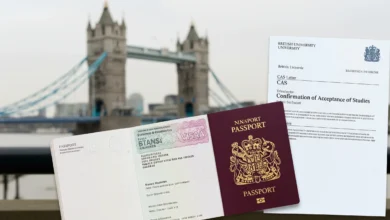German Language Proficiency Requirements for Students and Jobs

Navigating German language requirements is a crucial step for anyone hoping to study or work in Germany. While it might seem daunting, proving your language skills is the key to unlocking tuition-free university programs, thriving in the German job market, and fully immersing yourself in the culture.
This guide breaks down everything you need to know, from the different language levels and official tests to the specific requirements for university courses and professional careers.
Understanding the Language Levels: The CEFR Framework 🇩🇪
Most German institutions and employers measure language ability using the Common European Framework of Reference for Languages (CEFR). This framework has six levels, from basic to expert. Understanding them helps you set clear learning goals.
- A1 (Beginner): You can understand and use basic everyday expressions and introduce yourself.
- A2 (Elementary): You can communicate in simple, routine situations and describe your background.
- B1 (Intermediate): You can handle most situations while traveling and discuss familiar topics like work and hobbies.
- B2 (Upper-Intermediate): You can understand the main ideas of complex texts and interact with native speakers without much strain. This is a common minimum for many university courses.
- C1 (Advanced): You can understand a wide range of demanding texts and express yourself fluently and spontaneously. This is the standard for many master’s programs.
- C2 (Proficient/Mastery): You have near-native fluency and can understand virtually everything with ease.
Accepted German Language Tests 📝
To prove your proficiency, you’ll need to pass an official language test. While there are several options, these are the most widely recognized by German universities:
- TestDaF (Test of German as a Foreign Language): This is one of the most popular tests for prospective students. It’s available worldwide and scores you on four sections. A score of TDN 4 in all sections is typically required for university admission.
- DSH (German Language University Entrance Examination): This test is taken in Germany at the university you plan to attend. A DSH-2 or DSH-3 result is usually needed.
- Goethe-Zertifikat: The Goethe-Institut offers certificates for all levels from A1 to C2. The Goethe-Zertifikat C1 or C2 is accepted by most universities.
- telc Deutsch C1 Hochschule: This test is specifically designed for university applicants and is recognized across Germany.
- DSD II (Deutsches Sprachdiplom): This diploma, corresponding to levels B2/C1, is often taken by students at German schools abroad.
Language Requirements for University Studies 🎓
The required German level depends on your chosen degree program and the language of instruction.
Bachelor’s Programs
For most German-taught bachelor’s programs, you’ll need a B2 or C1 level. This ensures you can follow lectures, participate in seminars, and understand academic texts. You can typically prove this with a TestDaF 4 or DSH-2 certificate.
Master’s Programs
Master’s programs are often more demanding, frequently requiring a C1 level. This is especially true for humanities and social sciences. However, many master’s programs in STEM and business are taught entirely in English, for which you would need to provide IELTS or TOEFL scores instead.
PhD Programs
Requirements for doctoral candidates are flexible. While B2 or C1 is standard, some research-based programs may accept a B1 level, especially if your research will be conducted primarily in English.
What if Your German Isn’t Good Enough? Preparatory Courses
If you don’t meet the language requirements for direct university entry, don’t worry! You have options:
- Studienkolleg (Preparatory College): This is a one-year course designed for international students whose high school diploma isn’t recognized for direct entry. It prepares you in both language and subject-specific knowledge. You typically need a B1 level to be admitted.
- University Language Prep Courses: Many universities offer intensive language courses that can take you from a basic level (A2/B1) up to the required B2 or C1 level needed for admission.
Language Requirements for Working in Germany 💼
German language skills are a massive asset in the job market. While many international companies in Berlin operate in English, proficiency in German significantly expands your career opportunities and earning potential.
- General Professional Roles: A B2 level is often considered the minimum for effective communication in a professional environment.
- Healthcare (Doctors, Nurses): This field has strict requirements, usually demanding B2 or C1 for patient safety and clear communication.
- Engineering & IT: While English is common in tech, a B1 or B2 level is highly advantageous for collaborating with German colleagues and understanding technical documentation.
- Management & Client-Facing Roles: For these positions, a C1 level or higher is often necessary to negotiate, lead teams, and build strong relationships.
The Biggest Benefits of Learning German
Meeting the German language proficiency requirements is more than just checking a box. It’s an investment that pays off in multiple ways:
- Access to Tuition-Free Education: Most German-taught programs at public universities are free.
- Better Job Opportunities: Bilingual candidates are highly valued in Germany’s strong economy.
- Cultural Immersion: Speaking the language allows you to connect with locals, make friends, and truly experience German culture.
- Personal Growth: Learning a new language boosts your confidence, critical thinking, and problem-solving skills.
Disclaimer:
The information in this guide regarding German language proficiency levels (CEFR), accepted tests (e.g., TestDaF, DSH), and specific requirements for universities and jobs is for general informational purposes only.
Please be aware that these requirements can vary significantly between different universities, degree programs, employers, and visa categories. All requirements are set by the individual institutions and relevant German authorities and are subject to change without notice.
Before enrolling in a course, applying for a job, or submitting a visa application, you MUST confirm the specific and most current language requirements directly with the university’s admissions office, the hiring company, or the official German embassy/consulate.
Reliance on the information provided in this article is solely at your own risk.


